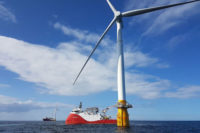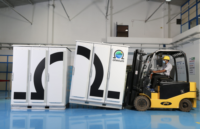The high-drama battle over global water giant Veolia Environment SA‘s bid to acquire Suez SA, its smaller but still sizable Paris-based rival, appears over with the former’s agreement on April 12 to boost the purchase price by $2 billion to $15.5 billion, and to spin off an entity to be owned by French investors and Suez employees.
Veolia purchased almost 30% of Suez last October. The boosted price is for the remainder. Veolia's push to acquire Suez evolved in February into a hostile takeover bid, with French government officials intervening to mediate.
The deal would create a global giant in waste and water management services under Veolia, with projected worldwide revenue for a combined company of about $44 billion, the firms said in a joint announcement.
Veolia is the world's largest water management services provider, operating in close to 50 countries with nearly 179,000 employees worldwide, it says.
Suez, which claims 90,000 employees, is the largest in providing private water management services. More than than 60% of its total sales are in Europe, with North America making up 13% of 2019 revenue.
Its North American unit, based in Paramus, N.J., ranks 11th on ENR's Top 200 Environmental Firms list, reporting $1.1 billion in 2019 revenue. The company says it maintains water assets for more than 6,000 municipal and industrial customers; and manages $4.1 billion in total assets.
The two companies are expected to enter into a definitive agreement on May 14. The transaction requires approval from antitrust authorities in several countries.
Under the planned combination, some elements of Suez will continue as a new business owned by French shareholders, including employees and private equity investors that include Meridiam, Ardian, and U.S.-based Global Infrastructure Partners.
The new entity will be mostly Suez’s French water businesses but also will include units in Italy, the Czech Republic, India and Australia. The North American business will remain under Veolia.
The combined firm would better compete with emerging Chinese competitors and boost innovation in growth areas such as environmental services and recycling, the companies say.
Last month, Veolia North America and GE Renewable Energy announced a multi-year agreement for the first U.S. wind turbine blade recycling program, with components used to replace raw materials for cement manufacturing they say will cut carbon dioxide emissions by a net 27%.
Also, through a concession with city officials in Rialto, Calif., and partnered with AECOM, Veolia is designing and installing a microgrid powered by a combination of biogas cogeneration, solar power and backup battery storage that will supply electricity for the city’s wastewater treatment plant when completed in 2024. The project, funded through the concession, is said to be one of the first of its kind in California.
But Veolia also remains in pre-trial stages of civil litigation in both state and federal courts related to claims stemming from Flint, Mich. water contamination issues that emerged several years ago. The firm had been a consultant to the city but maintains it was not responsible. and was not criminally charged.
Under the Veolia deal, Suez will end talks started last month to sell its Australian business to a Melbourne-based firm for $1.9 billion.
The transaction "guarantees the long-term future of Suez in France in a way that preserves competition, and ... jobs," said Veolia CEO Antoine Frerot, "The time for confrontation is over.”
Added Suez Chairman Philippe Varin: "We have reached an agreement in principle that recognizes the value of Suez. We will be vigilant to ensure that the conditions are met to reach a final agreement that .... offers development prospects.”
Veolia shares rose more than 9% and those of Suez climbed 7.8% on the Paris exchange on April 12.






Post a comment to this article
Report Abusive Comment